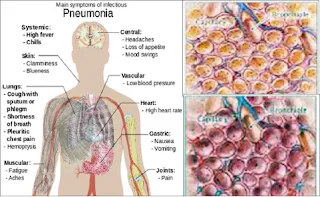When the report of a new analysis conducted by
Johns Hopkins University and Save the Children International hit the newsstand
revealing that Pneumonia will kill nearly 11 million global children by 2030,
not a few analysts were worried.
Indeed, many of them have deep concerns over the
report which also indicated that more than four million of these deaths could
easily be averted with concerted actions to improve rates of vaccination,
treatment and nutrition.
Yet, there are more worries as the report shows
that Nigeria, India, Pakistan and the Democratic Republic of Congo (DRC) are
likely to bear the highest burden of deaths, without timely intervention.
The report is based on a model developed by
researchers at John Hopkins University called the lives saved Tools (LIST).
They show nearly 11 million (10,865,728) children will die by 2030 on current
trends, with the highest burden of deaths in Nigeria (1,730,000), India
(1,710,000), Pakistan ( 706,000), the Democratic Republic of Congo (635,000)
and Ethiopia (407,000).
Kevin Watkins, CEO of Save the Children observed,
“It is the beggars’ belief that close to a million children are dying every
year from a disease that we have the knowledge and resources to defeat, there
is a vaccine available and a course of antibiotics costs just for 30 pence”.
“There are no pink ribbons, global summits or
marches for pneumonia. But for anyone who cares about justice for children and
their access to essential healthcare, this forgotten killer should be defining
cause of our age.”
It is therefore not surprising that recently, Save
the Children International in collaboration with the Lagos State Ministry of
Health organised a one-day forum to address the rising cases of pneumonia among
children, including its associated deaths among other consequences.
The event which was organised to mark this year’s
world Pneumonia Day brought to the fore causes of pneumonia which reportedly
kills more children globally than malaria, diarrhoea and measles combined.
Dr. Olufemi Taiwo, Permanent Secretary, Lagos
Ministry of Health, who spoke at the event, affirmed that his ministry
recognised the increased cases of pneumonia in the state and that in the past
two years they have embarked on activities to ensure routine immunisation.
Taiwo stated, “From statistics, we know there is
increase in the cases of pneumonia particularly in Lagos State and we do not
rest on our oasis, we ensure that every child completes routine immunisation,
but the challenge is that some of the mothers visit private clinics and faith-based
organisations. If we can work together and every child completes all routine
immunisation before the age of one, the sickness would be far from us.”
Maintaining that pneumonia is preventable, he
said, “With adequate nutrition and exclusive breast feeding, five million
children suffering from wasting will not end up suffering from pneumonia.”
Taiwo commended Save the Children International
for its efforts in ensuring the wellbeing of children locally and
globally, expressing his ministry’s
willingness to continue to collaborate with the organisation until pneumonia
and other children-related diseases become a thing of the past.
Also, Dr. Monsurat Adeleke, Coordinator State
Integrated Maternal Newborn and Child Health Care, defined pneumonia as a form
of acute respiratory infection that affects the small sacs in the lungs called
alveoli.
Alveoli, she explained could result into pus or
fluid filled Alveoli leading to painful breathing and ultimately limits oxygen
intake.
Dr. Adeleke further described the disease as
deadly, adding that it could be transmitted through inhalation of common
bacteria in a child’s nose in to the lungs; air-borne droplets-coughing and
sneezing and blood.
She said most of the deaths arising from pneumonia
occur in South Asia and sub-Saharan Africa.
The medical practitioner said, “Over 80 percent
occur among children under two, many of them in the first weeks of life. A
child who is severely malnourished is four more times likely to die of
pneumonia. Globally 51 million children suffered from wasting and they face
grave health risks.”
On the way forward, she recommended capacity
building of health workers across the health sector, with greater focus on the
private sector.
Dr. Oluwatosin Adeoye of Save the Children
International observed that the burden of pneumonia is too much on both locally
and globally.
“Even at the national level, Nigeria is one of the
countries that have the highest number of pneumonia in the world. We are still
battling HIV, malaria, diarrhea. Pneumonia is one of the most dangerous killer
diseases, so we say it is important we will be championing the case of children
in this regard. We are interested in children because we want to ensure that
our children are free from this deadly disease,” Adeoye stated.
He, therefore, advised that mothers should be
observant, adding that when they notice any of the symptoms of pneumonia, they
should take their wards to the clinic as early detection prevents the ailment
from escalating.
However, scaling up vaccination coverage to 90 per
cent of children under the age of five could save 610,000 lives; providing
cheap antibiotics could save 1.9
million, and ensuring children have good
nutrition could save 2.5 million.
If all three overlapping interventions were
carried out by 2030, the model suggests a total of 4.1 million deaths could be
averted. 2030 is the target date for sustainable Development Goals (SDGs),
which include an ambitious global pledge to “end preventable child deaths” and
achieve universal Health coverage.
To end preventable child deaths from diseases like
pneumonia, Save the Children wants to see the prices of major pneumonia
vaccines dramatically lowered to help allow more than 76 million infants to be
immunised. They also expect governments
of low and middle income countries to prioritise building strong health and
nutrition systems that reach the most marginalised




